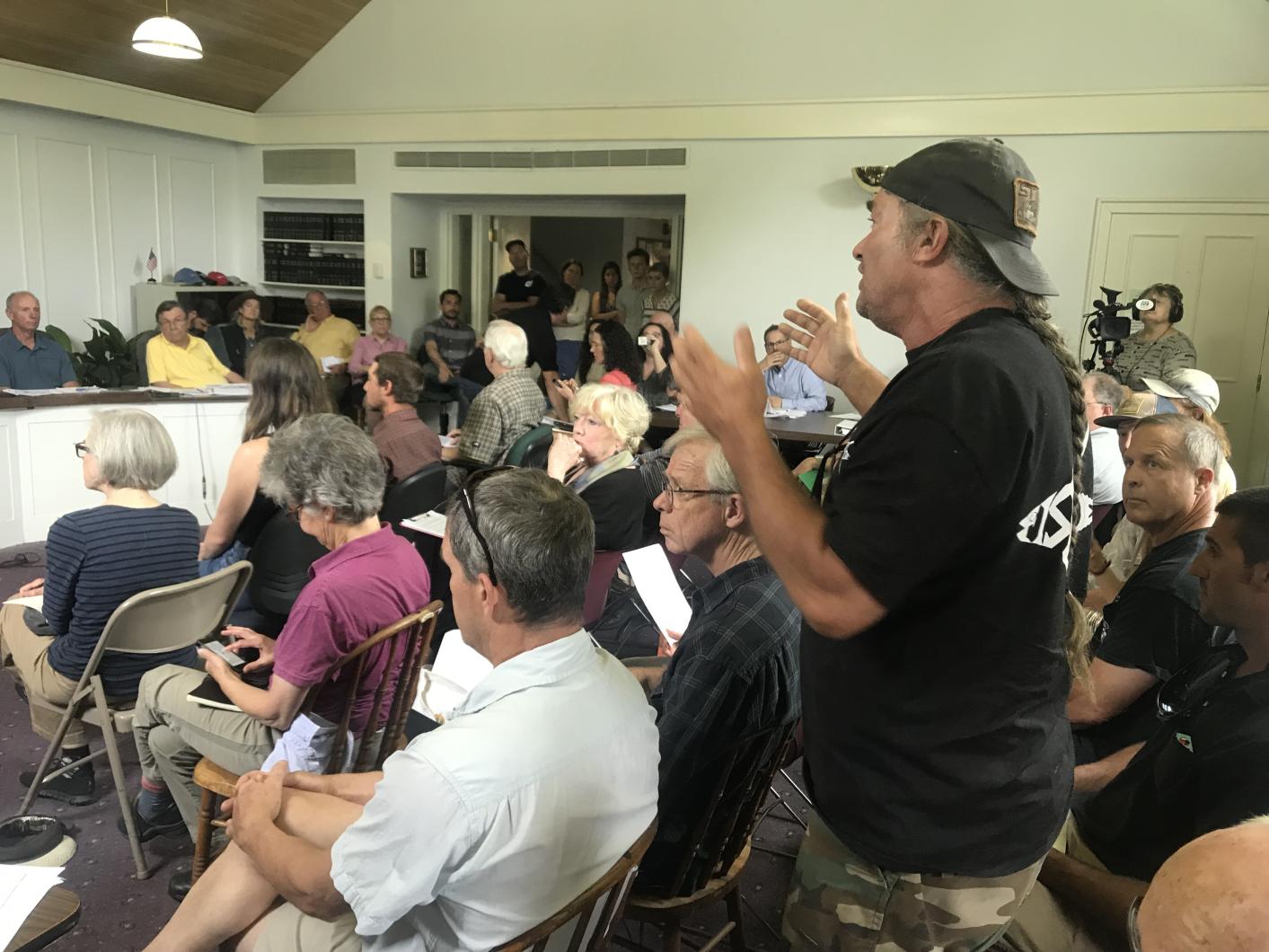Commercial fishermen and climate activists packed the Ted B. Morgan meeting room last Wednesday, sparring with each other during a marathon, five-hour public hearing before the Edgartown conservation commission over two proposed undersea cables that would connect the nation’s first industrial-scale offshore wind-farm to the mainland.
Although the cables have been approved by the Martha’s Vineyard Commission, among other regulatory bodies, the portions of the cables in Edgartown waters are also subject to review by the town conservation commission under the Massachusetts Wetlands Protection Act. The two, 220 kilovolt cables will run approximately one mile from Chappaquiddick’s eastern shore, connecting the proposed 80-turbine Vineyard Wind project to an electrical generating station in Barnstable.
Vineyard Wind, the New Bedford-based subsidiary of a Danish renewable energy company, bought two offshore wind lease areas from the federal government in 2015 and 2018. During an extensive permitting process over the past two years, wind farm developers have promised that impacts from the undersea cables will have a minor to negligible effect on marine life and seafloor habitats. The project has received substantial support from environmental activists on the Island, who believe that offshore wind is the most effective way for communities in the American northeast to combat climate change.
But at the hearing on Thursday, about a dozen commercial fishermen spoke out passionately against the project, arguing that renewable energy projects shouldn’t be pursued at the potential expense of some of the world’s most fertile fishing grounds.
“I’m an advocate for renewable energy and sustainable fisheries. I just think this project is going to have way more of an impact than they are saying it is,” said John Osmers, an Island commercial fisherman. “Who knows what we’re going to disturb and what species of marine life we’re going to damage with this project? I’d like to for there to be renewable energy, I just don’t think this is the way.”
Others were more vehement.
“I am also 100 per cent in support of renewable energies. But I am also 100 per cent opposed to Vineyard Wind’s project,” said fisherman Preston Butler. “Our cod stocks are finally coming back . . . and all of a sudden you guys want to sit there on a boat and pile-drive the crap out of the ocean floor for god knows how long.”
Offshore wind activists also spoke passionately, reiterating arguments about the importance of alternative energy as climate change continues to impact coastal communities.
“Wind is the renewable resource that the northeast coast has,” said Bill Lake, who serves on the Aquinnah energy committee. “It is simply not possible for us to get off fossil fuels in this area without offshore wind. If we don’t use it, we will be devastated by climate change.”
Ron Dagostino read an excerpt from the Bureau of Ocean Energy Management’s draft analysis of the environmental impacts from the project, which said most of the project’s expected disturbances to be minor.
“Due to the time and limited area involved, BOEM does not expect population level impacts on any given species,” Mr. Dagostino read. He further said that impacts on migratory fish, sea turtles, and the benthic habitat would be minor to negligible. “You have to consider the evidence, not conjecture,” he said.
Although the conservation commission only has jurisdiction over the portion of the underwater cables that run through Edgartown waters — and not the wind farm itself — the meeting on Thursday served as a public forum for both fishermen and wind activists to voice their support or concerns for a project with implications that extended far beyond a narrow stretch of ocean east of Chappaquiddick. The broadscale impacts of the wind farm, or the lack thereof, caused many who testified to become emotional. Tensions ran high throughout the standing-room only hearing.
Noli Taylor, who also serves on the Aquinnah energy committee, said that she supported the project because she feared for younger generations of Islanders, including her children, whose lives and livelihoods were threatened by climate change. Wes Brighton, who works as a fisherman in Menemsha, said the project also threatened his future livelihood.
“This is being rushed. It is going to be problem,” Mr. Brighton said. “We don’t know what the impacts of this are, and we are messing with the most pristine waters on the East Coast.”
After hours of exhaustive testimony, including a presentation from employees at Vineyard Wind, the conservation commission decided to close the public hearing. They kept the written record open for one week, and plan to deliberate on the project on July 10.
“It’s extraordinary to have this level of input. It’s what we need,” said conservation commission member Geoffrey Kontje. “The choice, after hearing everybody speaking today, seems to boil down to two things. Is the impact to your local environment worth the potential benefit to the global crisis we are in?”
“This is a tough one,” he concluded.







Comments (15)
Comments
Comment policy »